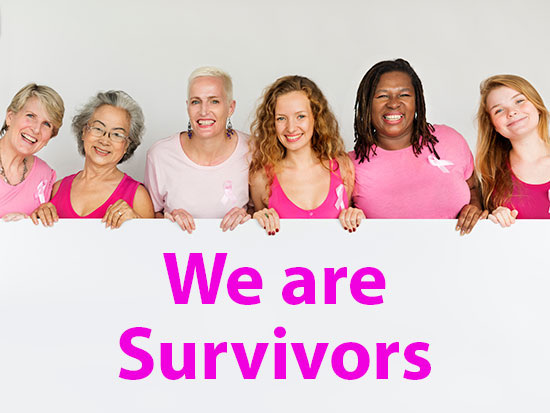 Patients are eligible for the Breast Cancer Survivorship Clinic if they have received a diagnosis of breast cancer, stages 0 to IIIC and are at least 12 months from diagnosis.The University of Alabama at Birmingham has established the Breast Cancer Survivorship Clinic to provide specialized follow-up care for breast cancer patients based on their individual health care needs. Survivorship care is provided by a nurse practitioner with expertise in breast cancer care and survivorship issues, and the program is carried out in collaboration with each patient’s primary treatment team.
Patients are eligible for the Breast Cancer Survivorship Clinic if they have received a diagnosis of breast cancer, stages 0 to IIIC and are at least 12 months from diagnosis.The University of Alabama at Birmingham has established the Breast Cancer Survivorship Clinic to provide specialized follow-up care for breast cancer patients based on their individual health care needs. Survivorship care is provided by a nurse practitioner with expertise in breast cancer care and survivorship issues, and the program is carried out in collaboration with each patient’s primary treatment team.
“The UAB Breast Cancer Survivorship Clinic will provide a comprehensive approach to the care of our breast cancer survivors as they complete their treatment and are ready to turn their attention to leading a healthy and productive life,” said Smita Bhatia, M.D., MPH, professor in the UAB Department of Pediatrics and director of the UAB Institute for Cancer Outcomes and Survivorship.
According to the National Cancer Institute, there are an estimated 15.5 million cancer survivors in the United States, representing 4.8 percent of the population. “With these numbers expected to increase, it is our goal to better understand and address the long-term effects of cancer treatment on the overall health and well-being of survivors,” Bhatia said.
The UAB Comprehensive Cancer Center has long been committed to developing intervention strategies to help guide and manage long-term problems after a diagnosis of cancer.
Bhatia’s work focuses on comprehensive care for cancer survivors encompassing ongoing health care to manage treatment-related complications, monitor for cancer recurrence, detect potential late effects and additional malignancies, manage underlying chronic disease, and provide psychosocial support services to address the specialized needs of cancer survivors and their families, with the overall goal of improving health and quality of life.
She is spearheading several efforts at UAB including the Breast Cancer Survivorship Clinic to create the vital link between patient, clinician and scientist in order to foster the collaborative relationships necessary to make rapid and significant advances in this increasingly vital facet of quality oncology care.
| There are an estimated 15.5 million cancer survivors in the United States, representing 4.8 percent of the population. “With these numbers expected to increase, it is our goal to better understand and address the long-term effects of cancer treatment on the overall health and well-being of survivors.” |
“The needs of breast cancer survivors are challenging, and as it is for most survivors in general, life is never quite the same,” said Andres Forero, M.D., professor in the UAB Division of Hematology and Oncology and medical director of the clinic. “Specialized care is needed to address the physical and emotional needs of cancer survivors so that they can not only survive, but also thrive, as they move forward with their lives.”
Patients are eligible for the Breast Cancer Survivorship Clinic if they have received a diagnosis of breast cancer, stages 0 to IIIC and are at least 12 months from diagnosis. Patients must have completed all breast cancer therapy (with the exception of hormonal therapy, which may be ongoing), with at least part of treatment provided at UAB. Eligible patients must also have no history of breast cancer spreading beyond the local breast area and/or lymph nodes and no history of breast cancer recurrence.
Supported by a nurse practitioner, Jessica Sparks, MSN, CRNP, a typical Breast Cancer Survivorship Clinic visit consists of a review of the patient’s medical history and symptoms, a physical exam, health education, and a psychosocial assessment. Patients will also receive a detailed Treatment Summary, follow-up tests as indicated, referrals and a visit report sent to the primary health care provider at the patient’s request. “Jessica provides personalized care that is tailored to each individual patient, taking into account their specific treatment history and making recommendations based on their unique needs,” said Wendy Landier, Ph.D., CRNP, associate professor in the Institute for Outcomes and Survivorship, who oversees the clinical management of the clinic.
“The goal of the program is to help each survivor stay as healthy as possible, and to prevent problems from emerging or catch them at an early stage when they are most easily treated,” Forero said.
For more information or to schedule an appointment, please call 205-638-2155 or email breastcancersurvivorship@uabmc.edu